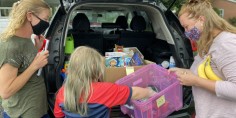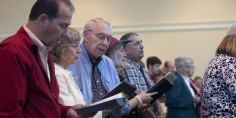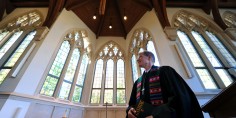Many churches want to make a difference in their communities — but despite good intentions, they sometimes lack the tools or know-how to run effective programs.
In North Carolina, The Duke Endowment has funded a group of statewide nonprofits to help rural United Methodist churches tackle challenges in the regions they serve. The organizations — NC Rural Center, Resourceful Communities, Partners for Health and Wholeness, and RAFI-USA — have expertise in food systems, public health and economic development. By providing guidance and technical assistance, they encourage congregations to put faith into action.
“Strong churches have unique positions in their communities,” says Robb Webb, director of the Endowment’s Rural Church program area. “Being local helps them pinpoint the most pressing needs; being small helps them respond nimbly. With an entrepreneurial spirit and the right resources, they can lead the way.”
This spring, when COVID-19 overwhelmed families with challenges, the four organizations worked with their rural church partners to fill gaps in a strained safety net.
“Our coaches work with churches to widen their lens and look at the bigger picture concerning their community’s challenges,” says Heather Kilbourne, program manager for the NC Rural Center’s Faith in Rural Communities initiative. “The pandemic created an increased sense of urgency to everything our church partners had been discussing over the previous six or seven months. COVID-19 made it imperative that churches step in — and many did, in exciting ways.”
NC Rural Center
Funded by The Duke Endowment, the NC Rural Center’s Faith in Rural Communities initiative trains congregations on how to identify and respond strategically to community needs. This spring, it distributed more than $27,000 in emergency grants for churches to address challenges exacerbated by COVID-19.
Three congregations are paying local restaurants to prepare meals for people in need. Another is using church space for telehealth counseling. First United Methodist in Elizabeth City is providing financial assistance for families facing unemployment or lost income.
“One household used the money to pay overdue utility bills after a medical emergency pushed them into debt,” says the church’s senior pastor, Benny Oakes. “It wasn’t a lot, and their challenges continue, but I can tell you the money at that moment made a difference.”








